牛津译林版(2019)必修 第一册Unit 1 Back to school Extended reading 课件(共35张PPT)
文档属性
| 名称 | 牛津译林版(2019)必修 第一册Unit 1 Back to school Extended reading 课件(共35张PPT) |  | |
| 格式 | pptx | ||
| 文件大小 | 4.0MB | ||
| 资源类型 | 教案 | ||
| 版本资源 | 牛津译林版(2019) | ||
| 科目 | 英语 | ||
| 更新时间 | 2024-03-27 12:51:10 | ||
图片预览

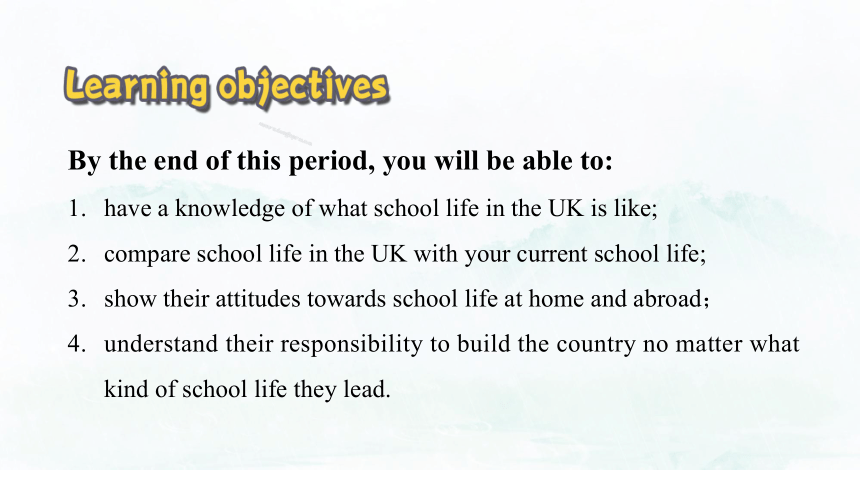


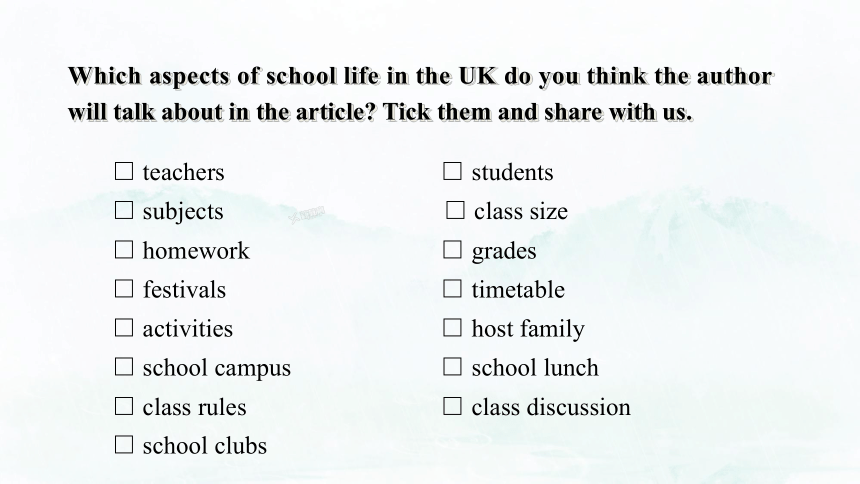
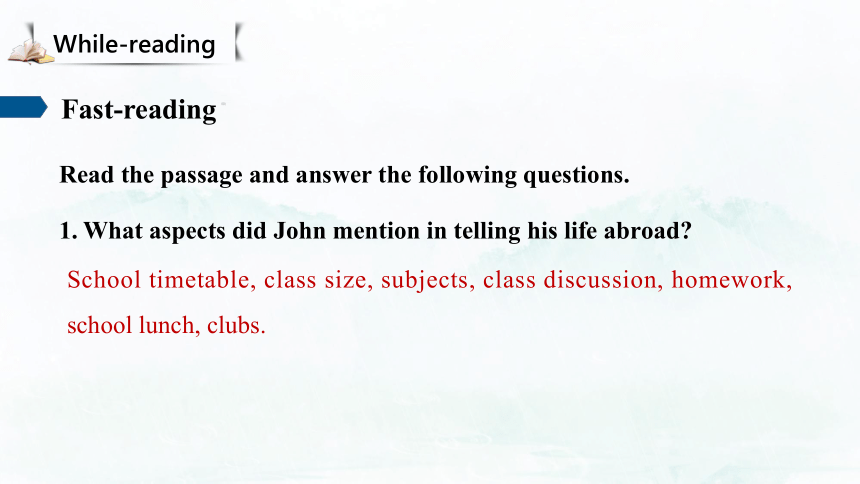
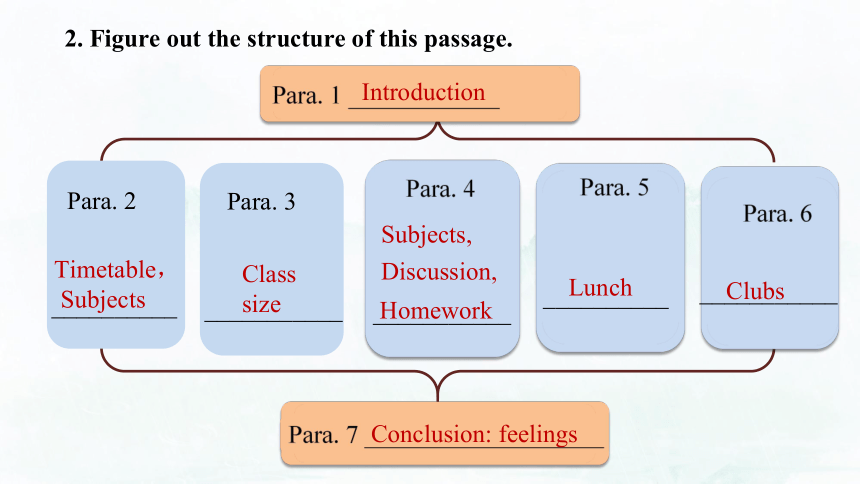
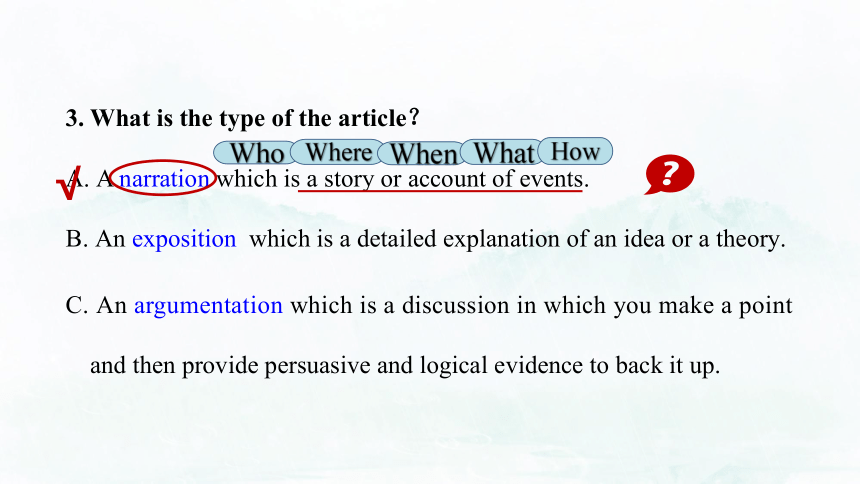
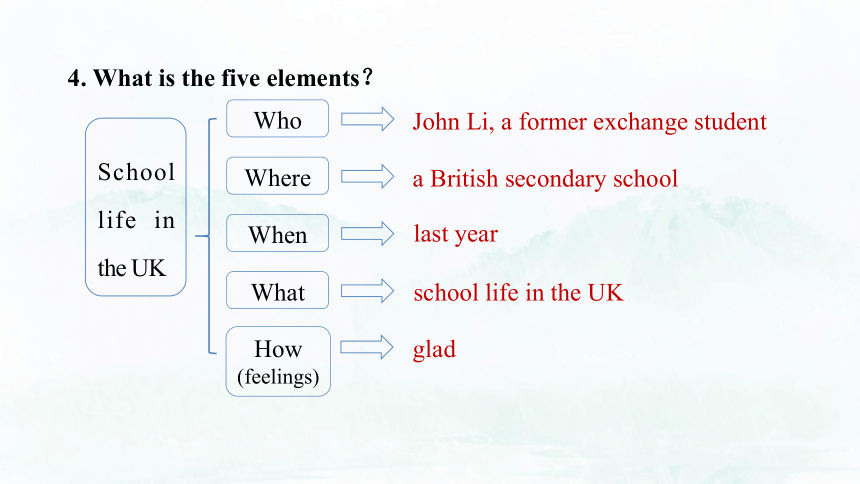
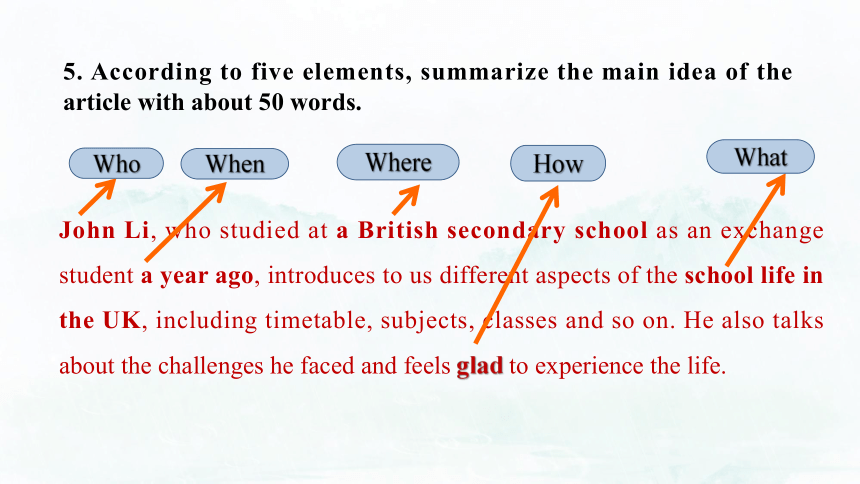
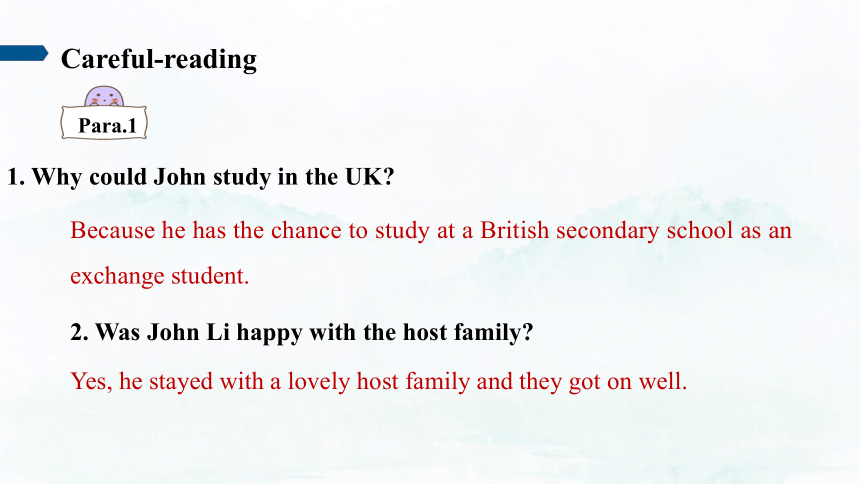
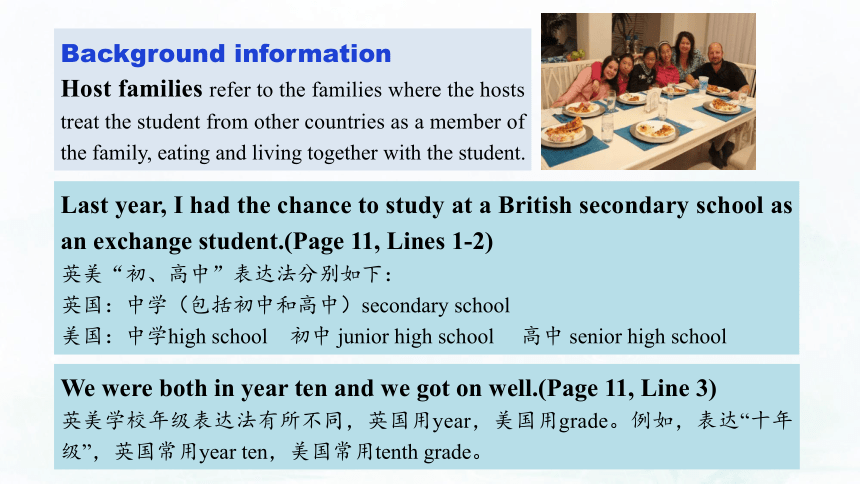
文档简介
(共35张PPT)
Unit 1
Back to school
Extended reading
By the end of this period, you will be able to:
have a knowledge of what school life in the UK is like;
compare school life in the UK with your current school life;
show their attitudes towards school life at home and abroad;
understand their responsibility to build the country no matter what kind of school life they lead.
CONTENTS
Pre-reading
I
While-reading
II
Post-reading
III
Sentences analysis
IV
Pre-reading
Do you want to study abroad
If so, which country do you want to go
What do you think the school life abroad like
John Li, a Chinese senior high school student, has spent a year studying in the UK. Read his article in the school magazine about his school life abroad.
Which aspects of school life in the UK do you think the author will talk about in the article Tick them and share with us.
□ teachers □ students
□ subjects □ class size
□ homework □ grades
□ festivals □ timetable
□ activities □ host family
□ school campus □ school lunch
□ class rules □ class discussion
□ school clubs
While-reading
Fast-reading
Read the passage and answer the following questions.
School timetable, class size, subjects, class discussion, homework, school lunch, clubs.
What aspects did John mention in telling his life abroad
Para. 1 ____________
2. Figure out the structure of this passage.
Para. 2
Para. 3
Para. 4
Para. 6
Para. 5
Para. 7 ___________________
Introduction
Timetable,
Subjects
Class
size
Subjects,
Discussion,
Homework
Lunch
Clubs
___________
___________
__________
__________
___________
Conclusion: feelings
3. What is the type of the article?
A. A narration which is a story or account of events.
B. An exposition which is a detailed explanation of an idea or a theory.
C. An argumentation which is a discussion in which you make a point and then provide persuasive and logical evidence to back it up.
Who
Where
√
When
What
How
John Li, a former exchange student
a British secondary school
last year
school life in the UK
School life in the UK
Who
Where
When
What
How
(feelings)
glad
4. What is the five elements?
John Li, who studied at a British secondary school as an exchange student a year ago, introduces to us different aspects of the school life in the UK, including timetable, subjects, classes and so on. He also talks about the challenges he faced and feels glad to experience the life.
When
Where
What
5. According to five elements, summarize the main idea of the article with about 50 words.
Who
How
Careful-reading
Para.1
1. Why could John study in the UK
Because he has the chance to study at a British secondary school as an exchange student.
2. Was John Li happy with the host family
Yes, he stayed with a lovely host family and they got on well.
Background information
Host families refer to the families where the hosts treat the student from other countries as a member of the family, eating and living together with the student.
Last year, I had the chance to study at a British secondary school as an exchange student.(Page 11, Lines 1-2)
英美“初、高中”表达法分别如下:
英国:中学(包括初中和高中)secondary school
美国:中学high school 初中 junior high school 高中 senior high school
We were both in year ten and we got on well.(Page 11, Line 3)
英美学校年级表达法有所不同,英国用year,美国用grade。例如,表达“十年级”,英国常用year ten,美国常用tenth grade。
The school day begins at and ends at .
Timetable
Subjects
Classes
Homework
School lunch
Clubs
9 a.m.
4 p.m.
School life in the UK
Paras.2-6
1. Read paras. 2-6 and fill in the following blanks.
Students usually have to learn ______ subjects in year ten.
Compulsory courses(必修课): English, Maths, Biology, Chemistry and Physics.
Optional courses(选修课): History, and .
Timetable
Subjects
Classes
Homework
School lunch
Clubs
nine
Art
Business
School life in the UK
Timetable
Subjects
Classes
Homework
School lunch
Clubs
①students move around for every lesson.
②20 students per class
③He most of the classes, but some of them were
quite challenging for him.
④Class ________ is very important.ince . ........... ....
Students
20
discussion
enjoyed
challenging
School life in the UK
Timetable
Subjects
Classes
Homework
School lunch
Clubs
Homework in the UK is ______ than that in China, but it is still ______________.
less
challenging
School life in the UK
Timetable
Subjects
Classes
Homework
School lunch
Clubs
Lots of options. Bread and , chicken pie and are
included.
butter
There are many clubs. John enjoy _________________tand
______________.h__e Theatre ub.
the Rugby Club
the Theatre Club
puddings
School life in the UK
2. What challenges did John meet when studying in the UK?
(1) In the beginning, however, it was still tough for me to remember everyone’s name! (L11-12)
(2) However, learning in English was a great challenge for me. There were a lot of difficult English words, especially in Geography and Biology. Class discussion is very important in the UK, but I could not make a great contribution because sometimes I wasn’t able to express myself clearly in English. Although there was not as much homework as I was used to, it was still challenging. (L17-21)
(3)…but I still missed my mum’s cooking. (L25-26)
3. Why was it difficult to remember everyone’s name
John chose several classes. Each class he would meet different teachers and classmates. There are about 20 students in most of his classes.
4. How did John overcome the challenge of learning in English
With the help and encouragement from his teachers and classmates, he overcame the challenge of learning in English and had his language skills improved a lot.
5. How did John develop Paras. 2-6
A. By giving examples. B. By comparison. C. A&B. D. In time order.
√
1. What’s the author’s attitude towards his school life in the UK
A. Negative B. Positive C. Doubtful D. indifferent
fantastic
(L38)
nice
(L38)
lovely
(L2)
enjoy
(L13&L31)
attract
(L29)
Great fun
(L31)
easy and enjoyable
(L15-16)
great
(L37)
Para.7
Tip:
Find the words and expressions showing John’s feelings and emotions.
√
glad
(L36)
Post-reading
1.What’s the differences between school life in the UK and in China?Which one do you like (Critical Thinking批判性思维)
UK China
Timetable 9:00-16:00
Subjects English; Maths; Biology; Chemistry; Physics; History; Art; Business...
Classes about 20 students; students move around
Homework less
School lunch bread; butter; chicken pie...
Clubs Rugby Club; Theatre Club
5:40-21:40/6:30-22:20
Chinese; English; Maths; Biology; Chemistry; Physics; History; Politics; Geography...
about 50 students; teachers move around
more
rice; pork; fish...
Volunteer Club
2.Do you want to study abroad Why (Creative Thinking创造性思维)
Yes. Studying abroad is a good opportunity to experience different cultures, which is helpful in broadening our horizons. It is beneficial for us to foster our perseverance and the ability to live independently. Also, there is no denying that some foreign technologies are advanced, so we can learn more in foreign countries and develop ourselves better.
No. Studying abroad also brings about challenges. We may have difficulty in adapting to the new environment. Having lived in China for many years, we may feel uncomfortable adjusting to foreign learning methods and ways of life. Besides, it will cost a lot of money for living and tuition, so not every student’s family can afford it.
2.Do you want to study abroad Why (Creative Thinking创造性思维)
As to the school life, we can work together to enrich it. But you’d better try to adapt to it.
Therefore,the responsibility bestowed by the times falls on nobody but us youth. (故今日之责任,不在他人,而全在少年)
主旨升华
Summary
The British secondary school day is from around 9 a.m. to 4 p.m. Students usually learn nine subjects. Every student must study English, Maths and the Science subjects 1.__________(include) Biology, Chemistry and Physics. John Li found some of them were quite
2.___________(challenge) and difficult, 3._________(especial) Geography and Biology while maths was quite easy and enjoyable. Luckily, 4._____the help and encouragement of teachers and classmates, his language skills improved over time. Each teacher has their own classroom and the students move around for every lesson.
including
challenging
especially
with
There were only about 20 students in most classes. In the beginning, however, 5.______ was still tough for him to remember everyone’s name! Class 6.__________(discuss) is very important in the UK. Homework is not so much 7.______ he was used to. For lunch, students can eat in the school dining hall. Joining clubs 8._______ (be) a great way to meet British students and make friends with them. The 9._______ that attracted him most was the Rugby Club. John Li feels very glad to have the opportunity 10.____________ (experience) this different way of life.
it
discussion
as
is
one
to experience
Last year, I had the chance to study at a British secondary school as an exchange student.(Para.1 Lines 1-2)
此句为__________; to study at a British secondary school为_____________________, 解释抽象名词the chance的具体内容;as意为________。
have the chance/opportunity to do sth. 意为________________。
翻译:
简单句
有机会做某事
去年,我有机会作为交换生到英国的一所中学读书。
to do不定式作后置定语
作为
Sentences Analysis
In the beginning, however, it was still tough for me to remember everyone’s name!(Para.3 Lines 11-12)
此句是__________, it 充当____________,真正的主语是____,结构为_____________________________。
tough意为________________________, 在原句中可替换为_________。
翻译:
简单句
然而刚开始时,我仍然很难记住所有人的名字!
形式主语
it is/was + adj.+for sb. to do sth.
困难的,严厉的,坚强的
difficult
I like it so much that I still use it as my alarm!(Para.4 Line 15)
此句是____________, so...that...意为“___________________”。so是副词,修饰形容词或副词;that 引导________________。
翻译:
主从复合句
如此……以至于……
结果状语从句
我太喜欢它了,现在还在用它当闹钟呢!
I found Maths quite easy and enjoyable because the material was less advanced in the UK than in China. (Para.4 Lines 15-16)
此句是___________, because 引导原因状语从句。其中quite easy and enjoyable是______________________, find复合结构 “find +宾语+宾补”,形容词(短语)、介词短语、非谓语动词常作find的宾补。
easy and enjoyable使用了___________________的修辞手法, 指两个单词或两个单词以上的首个字母相同且发音相同,以增加语言的节奏感,类似表达有“safe and sound(安然无恙)”“Pride and Prejudice (傲慢与偏见)”。
翻译:
主从复合句
我觉得数学很简单,学起来很愉快,因为英国的教材没有中国的难。
形容词短语作宾语补足语
alliteration(押头韵)
Although there was not as much homework as I was used to, it was still challenging. (Para.4 Lines 20-21)
此句为__________,although引导______________.as…as…意为“_____________”,表示_________比较,如果涉及数量或程度可用:as much+ (不可数名词+) as / as many+ (可数名词复数+) as,第二个as为连词。
翻译:
主从复合句
让步状语从句
同级的
尽管作业不像以前那么繁重,却仍旧很有挑战性。
和……一样
After school, there were many clubs to join. (Para.6 Line 28)
该句主干为_____________________; to join 为____________________修饰clubs。
翻译:
there were many clubs
放学后,有许多俱乐部可以参加。
to do不定式作后置定语
(After school, there were many clubs to join.) The one that attracted me most was the Rugby Club. (Para.6 Lines 28-30)
此句是____________。主句为____;that 引导____________,修饰先行词the one(指代上一句的_______),that 在从句中作主语,________省略。
翻译:
主从复合句
定语从句
不可
(放学后,有许多俱乐部可以参加。)最吸引我的是橄榄球俱乐部。
club
Joining clubs was a great way to meet British students and make friends with them. (Para.6 Lines 34-35)
此句是________。Joining clubs为_______________,谓语动词用______。to meet British students and make friends with them 为______________________, 解释抽象名词way的具体内容。
a great way to do sth.意为________________
make friends with sb.意为_________________
翻译:
简单句
动名词作主语
与……交朋友
加入俱乐部是与英国学生相识、交友的好方法。
……的好方法
to do不定式作后置定语
单数
Review what we have learned and preview language points.
Homework
Unit 1
Back to school
Extended reading
By the end of this period, you will be able to:
have a knowledge of what school life in the UK is like;
compare school life in the UK with your current school life;
show their attitudes towards school life at home and abroad;
understand their responsibility to build the country no matter what kind of school life they lead.
CONTENTS
Pre-reading
I
While-reading
II
Post-reading
III
Sentences analysis
IV
Pre-reading
Do you want to study abroad
If so, which country do you want to go
What do you think the school life abroad like
John Li, a Chinese senior high school student, has spent a year studying in the UK. Read his article in the school magazine about his school life abroad.
Which aspects of school life in the UK do you think the author will talk about in the article Tick them and share with us.
□ teachers □ students
□ subjects □ class size
□ homework □ grades
□ festivals □ timetable
□ activities □ host family
□ school campus □ school lunch
□ class rules □ class discussion
□ school clubs
While-reading
Fast-reading
Read the passage and answer the following questions.
School timetable, class size, subjects, class discussion, homework, school lunch, clubs.
What aspects did John mention in telling his life abroad
Para. 1 ____________
2. Figure out the structure of this passage.
Para. 2
Para. 3
Para. 4
Para. 6
Para. 5
Para. 7 ___________________
Introduction
Timetable,
Subjects
Class
size
Subjects,
Discussion,
Homework
Lunch
Clubs
___________
___________
__________
__________
___________
Conclusion: feelings
3. What is the type of the article?
A. A narration which is a story or account of events.
B. An exposition which is a detailed explanation of an idea or a theory.
C. An argumentation which is a discussion in which you make a point and then provide persuasive and logical evidence to back it up.
Who
Where
√
When
What
How
John Li, a former exchange student
a British secondary school
last year
school life in the UK
School life in the UK
Who
Where
When
What
How
(feelings)
glad
4. What is the five elements?
John Li, who studied at a British secondary school as an exchange student a year ago, introduces to us different aspects of the school life in the UK, including timetable, subjects, classes and so on. He also talks about the challenges he faced and feels glad to experience the life.
When
Where
What
5. According to five elements, summarize the main idea of the article with about 50 words.
Who
How
Careful-reading
Para.1
1. Why could John study in the UK
Because he has the chance to study at a British secondary school as an exchange student.
2. Was John Li happy with the host family
Yes, he stayed with a lovely host family and they got on well.
Background information
Host families refer to the families where the hosts treat the student from other countries as a member of the family, eating and living together with the student.
Last year, I had the chance to study at a British secondary school as an exchange student.(Page 11, Lines 1-2)
英美“初、高中”表达法分别如下:
英国:中学(包括初中和高中)secondary school
美国:中学high school 初中 junior high school 高中 senior high school
We were both in year ten and we got on well.(Page 11, Line 3)
英美学校年级表达法有所不同,英国用year,美国用grade。例如,表达“十年级”,英国常用year ten,美国常用tenth grade。
The school day begins at and ends at .
Timetable
Subjects
Classes
Homework
School lunch
Clubs
9 a.m.
4 p.m.
School life in the UK
Paras.2-6
1. Read paras. 2-6 and fill in the following blanks.
Students usually have to learn ______ subjects in year ten.
Compulsory courses(必修课): English, Maths, Biology, Chemistry and Physics.
Optional courses(选修课): History, and .
Timetable
Subjects
Classes
Homework
School lunch
Clubs
nine
Art
Business
School life in the UK
Timetable
Subjects
Classes
Homework
School lunch
Clubs
①students move around for every lesson.
②20 students per class
③He most of the classes, but some of them were
quite challenging for him.
④Class ________ is very important.ince . ........... ....
Students
20
discussion
enjoyed
challenging
School life in the UK
Timetable
Subjects
Classes
Homework
School lunch
Clubs
Homework in the UK is ______ than that in China, but it is still ______________.
less
challenging
School life in the UK
Timetable
Subjects
Classes
Homework
School lunch
Clubs
Lots of options. Bread and , chicken pie and are
included.
butter
There are many clubs. John enjoy _________________tand
______________.h__e Theatre ub.
the Rugby Club
the Theatre Club
puddings
School life in the UK
2. What challenges did John meet when studying in the UK?
(1) In the beginning, however, it was still tough for me to remember everyone’s name! (L11-12)
(2) However, learning in English was a great challenge for me. There were a lot of difficult English words, especially in Geography and Biology. Class discussion is very important in the UK, but I could not make a great contribution because sometimes I wasn’t able to express myself clearly in English. Although there was not as much homework as I was used to, it was still challenging. (L17-21)
(3)…but I still missed my mum’s cooking. (L25-26)
3. Why was it difficult to remember everyone’s name
John chose several classes. Each class he would meet different teachers and classmates. There are about 20 students in most of his classes.
4. How did John overcome the challenge of learning in English
With the help and encouragement from his teachers and classmates, he overcame the challenge of learning in English and had his language skills improved a lot.
5. How did John develop Paras. 2-6
A. By giving examples. B. By comparison. C. A&B. D. In time order.
√
1. What’s the author’s attitude towards his school life in the UK
A. Negative B. Positive C. Doubtful D. indifferent
fantastic
(L38)
nice
(L38)
lovely
(L2)
enjoy
(L13&L31)
attract
(L29)
Great fun
(L31)
easy and enjoyable
(L15-16)
great
(L37)
Para.7
Tip:
Find the words and expressions showing John’s feelings and emotions.
√
glad
(L36)
Post-reading
1.What’s the differences between school life in the UK and in China?Which one do you like (Critical Thinking批判性思维)
UK China
Timetable 9:00-16:00
Subjects English; Maths; Biology; Chemistry; Physics; History; Art; Business...
Classes about 20 students; students move around
Homework less
School lunch bread; butter; chicken pie...
Clubs Rugby Club; Theatre Club
5:40-21:40/6:30-22:20
Chinese; English; Maths; Biology; Chemistry; Physics; History; Politics; Geography...
about 50 students; teachers move around
more
rice; pork; fish...
Volunteer Club
2.Do you want to study abroad Why (Creative Thinking创造性思维)
Yes. Studying abroad is a good opportunity to experience different cultures, which is helpful in broadening our horizons. It is beneficial for us to foster our perseverance and the ability to live independently. Also, there is no denying that some foreign technologies are advanced, so we can learn more in foreign countries and develop ourselves better.
No. Studying abroad also brings about challenges. We may have difficulty in adapting to the new environment. Having lived in China for many years, we may feel uncomfortable adjusting to foreign learning methods and ways of life. Besides, it will cost a lot of money for living and tuition, so not every student’s family can afford it.
2.Do you want to study abroad Why (Creative Thinking创造性思维)
As to the school life, we can work together to enrich it. But you’d better try to adapt to it.
Therefore,the responsibility bestowed by the times falls on nobody but us youth. (故今日之责任,不在他人,而全在少年)
主旨升华
Summary
The British secondary school day is from around 9 a.m. to 4 p.m. Students usually learn nine subjects. Every student must study English, Maths and the Science subjects 1.__________(include) Biology, Chemistry and Physics. John Li found some of them were quite
2.___________(challenge) and difficult, 3._________(especial) Geography and Biology while maths was quite easy and enjoyable. Luckily, 4._____the help and encouragement of teachers and classmates, his language skills improved over time. Each teacher has their own classroom and the students move around for every lesson.
including
challenging
especially
with
There were only about 20 students in most classes. In the beginning, however, 5.______ was still tough for him to remember everyone’s name! Class 6.__________(discuss) is very important in the UK. Homework is not so much 7.______ he was used to. For lunch, students can eat in the school dining hall. Joining clubs 8._______ (be) a great way to meet British students and make friends with them. The 9._______ that attracted him most was the Rugby Club. John Li feels very glad to have the opportunity 10.____________ (experience) this different way of life.
it
discussion
as
is
one
to experience
Last year, I had the chance to study at a British secondary school as an exchange student.(Para.1 Lines 1-2)
此句为__________; to study at a British secondary school为_____________________, 解释抽象名词the chance的具体内容;as意为________。
have the chance/opportunity to do sth. 意为________________。
翻译:
简单句
有机会做某事
去年,我有机会作为交换生到英国的一所中学读书。
to do不定式作后置定语
作为
Sentences Analysis
In the beginning, however, it was still tough for me to remember everyone’s name!(Para.3 Lines 11-12)
此句是__________, it 充当____________,真正的主语是____,结构为_____________________________。
tough意为________________________, 在原句中可替换为_________。
翻译:
简单句
然而刚开始时,我仍然很难记住所有人的名字!
形式主语
it is/was + adj.+for sb. to do sth.
困难的,严厉的,坚强的
difficult
I like it so much that I still use it as my alarm!(Para.4 Line 15)
此句是____________, so...that...意为“___________________”。so是副词,修饰形容词或副词;that 引导________________。
翻译:
主从复合句
如此……以至于……
结果状语从句
我太喜欢它了,现在还在用它当闹钟呢!
I found Maths quite easy and enjoyable because the material was less advanced in the UK than in China. (Para.4 Lines 15-16)
此句是___________, because 引导原因状语从句。其中quite easy and enjoyable是______________________, find复合结构 “find +宾语+宾补”,形容词(短语)、介词短语、非谓语动词常作find的宾补。
easy and enjoyable使用了___________________的修辞手法, 指两个单词或两个单词以上的首个字母相同且发音相同,以增加语言的节奏感,类似表达有“safe and sound(安然无恙)”“Pride and Prejudice (傲慢与偏见)”。
翻译:
主从复合句
我觉得数学很简单,学起来很愉快,因为英国的教材没有中国的难。
形容词短语作宾语补足语
alliteration(押头韵)
Although there was not as much homework as I was used to, it was still challenging. (Para.4 Lines 20-21)
此句为__________,although引导______________.as…as…意为“_____________”,表示_________比较,如果涉及数量或程度可用:as much+ (不可数名词+) as / as many+ (可数名词复数+) as,第二个as为连词。
翻译:
主从复合句
让步状语从句
同级的
尽管作业不像以前那么繁重,却仍旧很有挑战性。
和……一样
After school, there were many clubs to join. (Para.6 Line 28)
该句主干为_____________________; to join 为____________________修饰clubs。
翻译:
there were many clubs
放学后,有许多俱乐部可以参加。
to do不定式作后置定语
(After school, there were many clubs to join.) The one that attracted me most was the Rugby Club. (Para.6 Lines 28-30)
此句是____________。主句为____;that 引导____________,修饰先行词the one(指代上一句的_______),that 在从句中作主语,________省略。
翻译:
主从复合句
定语从句
不可
(放学后,有许多俱乐部可以参加。)最吸引我的是橄榄球俱乐部。
club
Joining clubs was a great way to meet British students and make friends with them. (Para.6 Lines 34-35)
此句是________。Joining clubs为_______________,谓语动词用______。to meet British students and make friends with them 为______________________, 解释抽象名词way的具体内容。
a great way to do sth.意为________________
make friends with sb.意为_________________
翻译:
简单句
动名词作主语
与……交朋友
加入俱乐部是与英国学生相识、交友的好方法。
……的好方法
to do不定式作后置定语
单数
Review what we have learned and preview language points.
Homework
